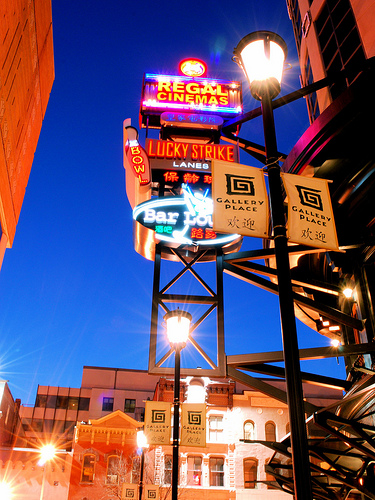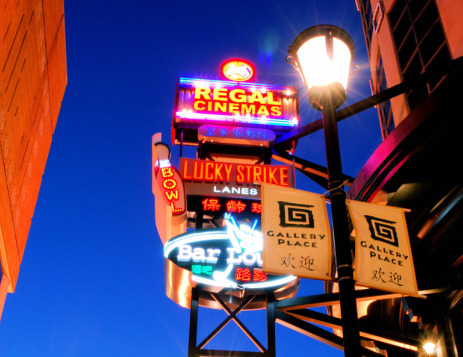 The bright lights of Gallery Place in Washington, D.C., draw teens like moths to a flame.Photo courtesy M.V. Jantzen via FlickrName an urban critter that’s as common as pigeons, as persistent as cockroaches, as feared (by some) as rats.
The bright lights of Gallery Place in Washington, D.C., draw teens like moths to a flame.Photo courtesy M.V. Jantzen via FlickrName an urban critter that’s as common as pigeons, as persistent as cockroaches, as feared (by some) as rats.
We’re talking about teenagers. Especially in groups. Especially when they’re — God forbid — hanging out.
Owners of Gallery Place, a shopping and recreation center in Washington, D.C., have gotten so fed up with young people lounging around their property — and, presumably, not spending money — that they’ve imported a device from the United Kingdom in the hopes of driving the youth away, a story first reported in the Washington Post.
It’s called a Mosquito, and it gives off a persistent, high-pitched tone that can be heard all too well by people under the age of about 25, while old folks are happily oblivious to the intensely irritating sound. (If you’re over 25, listen to it with someone younger than you and prepare to feel really, really old.)
Think of it as animal training for humans. “Field trials have shown that teenagers are acutely aware of the MosquitoTM and usually move away from the area within 5-20 minutes,” says the manufacturer’s website. “The field trials also suggest that after several uses, the groups of children/teenagers tend not to loiter in the areas covered by the Mosquito, even when it is not turned on.”
That’s good news for retailers who don’t want paying customers, many of whom travel in from suburban areas, to be freaked out by the packs of young people who flock to the area around Gallery Place. The Mosquito, in this case, is mounted on a wall of a private building — but is audible on adjacent public property, including a nearby Metro entrance.
Gallery Place, with its movie theaters, bowling alley, and shops, has become part of one of the capital city’s most happening street scenes in the past five to 10 years. Like many such places, it has attracted some homeless people (of all ages) and petty crime. At times, the scene has become violent.
Dan Malouff, of the transportation blog BeyondDC.com, thinks that’s no excuse to send what he says is the wrong message — that teenagers, as a class of human beings, are not welcome in what he calls Washington’s equivalent of Times Square. In a recent opinion piece on the Washington Post site, Malouff wrote, “Discrimination against an entire group of people because of the actions of a few bad apples is not acceptable.”
That argument has been made for years in Europe and the U.K., where the device was invented in 2005, and where thousands are now in use around convenience stores, schoolyards, and bus shelters. The Council of Europe has condemned the Mosquito, a petition in the U.K. has sought to ban it, and individual communities have prohibited its use on public property.
Malouff said in an interview that teenagers deserve to be in the Gallery Place area as much as anyone else. “Teenagers are part of society, they’re part of a healthy civilization,” he said. “Your right to be uncomfortable doesn’t trump their right to be there.”
Tom Murphy, a senior fellow at the Urban Land Institute and a former mayor of Pittsburgh, says he has never heard of the device — “it reminds me of trying to keep geese or deer away” — and couldn’t comment on its legality.
He did say that the problems at Gallery Place are familiar ones. “If you called any mayor in America they’d tell you they are facing the same issues,” he said. “How do you control behavior in public places so that it doesn’t become threatening or disruptive? You do have commerce happening there. This won’t work as a public place if you don’t balance the desire of teenagers to hang out there and the need of people to go and shop. It’s a commercial space, not a recreation area.”
Neither the development corporation that installed the Mosquito nor the Mosquito’s manufacturer, Compound Security Systems (CSS), returned requests for comment. However, in a comment on Malouff’s Post piece, a CSS executive had this to say:
Of course teens have a right to be in any public place. It is a basic human right, however, what they do NOT have a right to do is act in an anti-social manner that offends or worries other members of the public. They also should not be fighting, something which has occurred on a large scale at this location.
The blurring of the lines between public space and private property has been increasing in recent years, with more developers building “lifestyle centers” that look like idealized suburban streets, and with public-private partnerships providing a much-needed funding mechanism for many city parks. Who gets to use those spaces, and how, is likely to remain an issue. And we might be hearing (or not hearing) more Mosquitoes in the future.
Malouff says that better policing should be the answer, not treating young people like a species of pest and moving the problem along. “If anyone’s breaking the law, then sure, we ought to have a police presence — maybe on foot as opposed to screaming up in cruisers when there’s a problem,” he said. “But saying that kids have to be doing organized team sports, or cooping them up in Mom’s basement and telling them they have to play video games, is just wrong. Our public spaces should be accepting of teenagers hanging out — which is what they do.”
Watch the Washington Post video report on the Mosquito.



